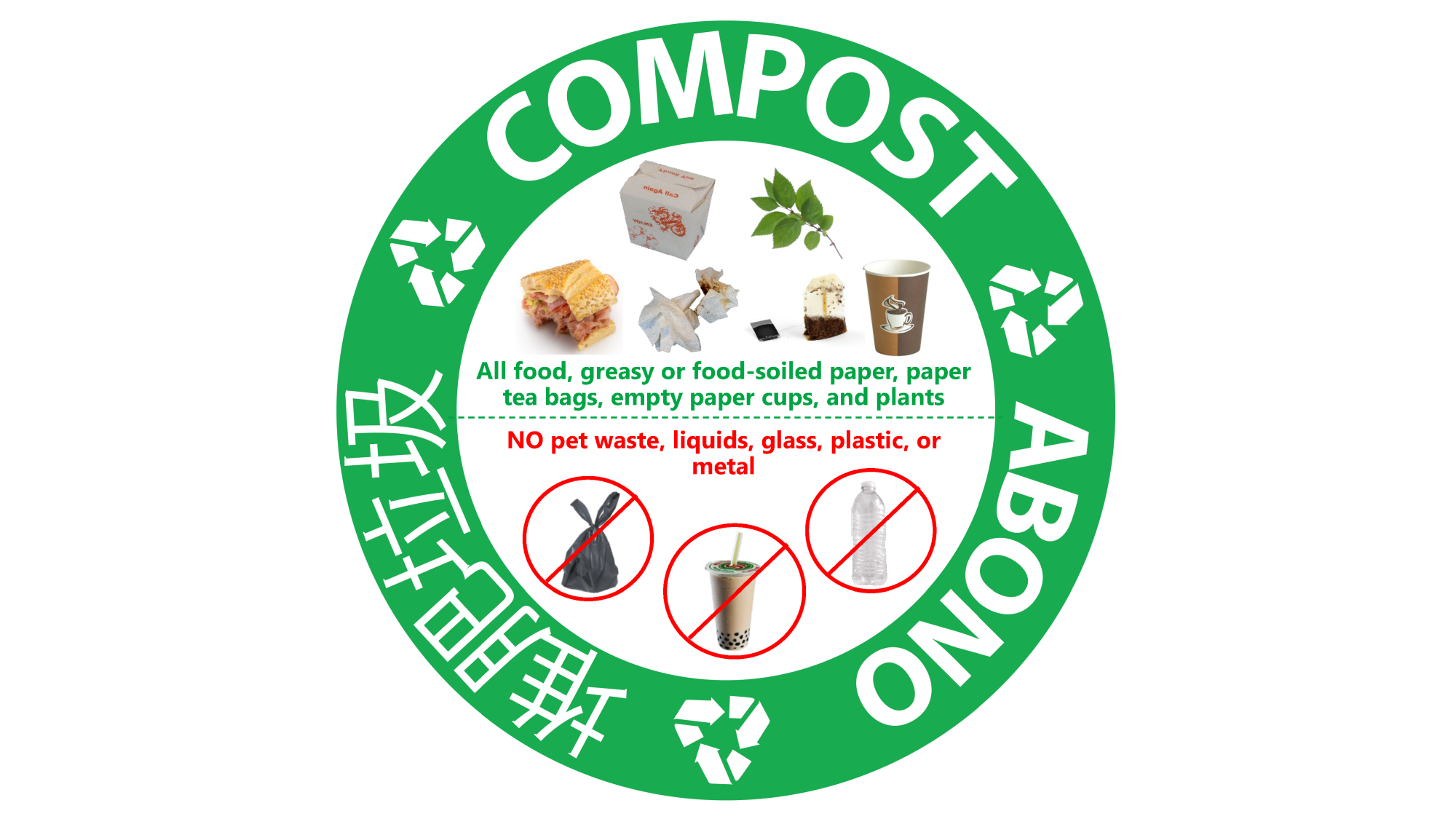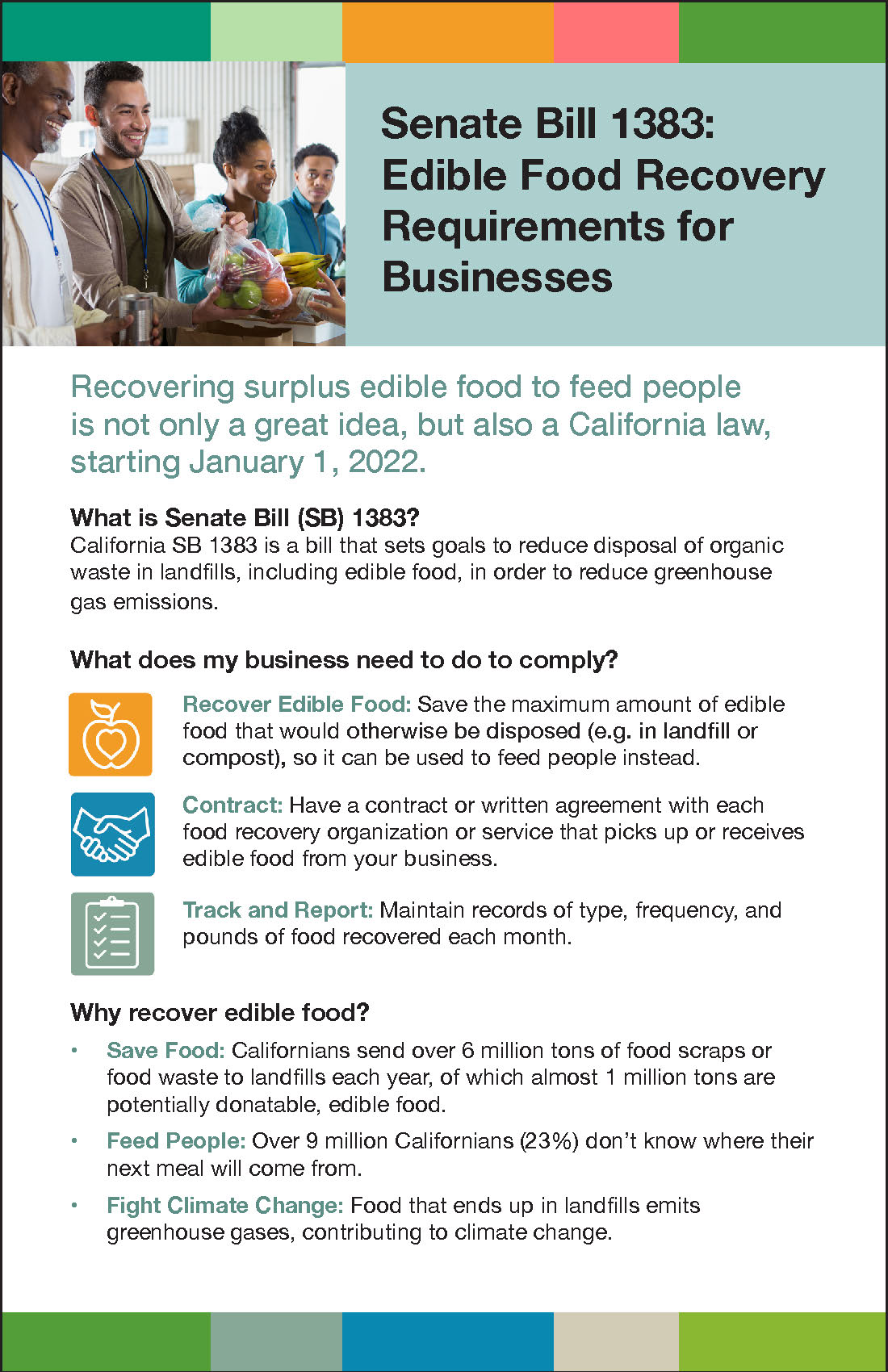SB-1383
California’s Short-lived Climate Pollutant Reduction Strategy (SB 1383)
Important Dates
Jan. 1, 2022 - Implementation begins citywide for contamination monitoring, procurement, and edible food recovery.
Jan. 1, 2024 - Expanded edible food recovery begins.
Jan. 1, 2024 - Enforcement begins: jurisdictions are required by the state regulations to take action against non-compliant entities.
California is now experiencing the effects of a climate crisis: hotter summers with world record-breaking temperatures, even more devastating fire seasons, more extreme droughts, and rising sea levels that erode our coastlines.
Scientists tell us that greenhouse gasses, including methane from landfills, cause climate change.
- Methane is a climate super pollutant 84 times more potent than carbon dioxide.
- Methane is generated when organics like food scraps, yard trimmings, paper, and cardboard are disposed in landfills.
- Landfills are the third largest source of methane in California, causing 20% of the state’s methane.
- Organics make up half of what Californians dump in landfills (including in Cupertino!)
To respond to this climate crisis, California is implementing statewide organic waste recycling and surplus food recovery.
These extensive regulations are known as the Short-Lived Climate Pollutant Reduction Strategy, commonly referred to by the Senate Bill reference number SB1383.

We are all part of the solution
Cupertino is collectively working on reducing organic waste sent to the landfill. Find out your role below:
Single-Family Homes
Single-Family Home Residents and Multifamily Complexes of Less than Five Units
- Residents are required to subscribe to and participate in their organics curbside collection service.
- Residents are required to properly sort their organic waste into the correct containers.
-
Multi-Family Homes
Multifamily Residents and Multifamily Complexes (5 units or more)
The following activities would be conducted by the multifamily complex property owner or the manager:
- Multifamily complexes are required to subscribe to and participate in their jurisdiction’s organics curbside collection service and make it available for employees and tenants.
- They must supply and allow access to an adequate number, size, and location of containers with the correct labels or container colors.
- They must also:
- Annually educate employees and tenants on how to properly sort organic waste into the correct bins, AND
- Provide information to new tenants within 14 days of occupation of the premises. Contact Recology for a residential move in kit.
Multifamily Complex Residents
Residents of multifamily complexes must properly sort their organic waste into the correct containers.
*Multifamily complexes with fewer than 5 units should see Organics Collection for Single Family guidelines.*
Businesses
- Businesses are required to subscribe to and participate in their jurisdiction’s organics collection service.
- Businesses must provide collection containers for organic waste and recyclables in all areas where disposal containers are provided for customers, except in restrooms.
- However, if a business does not generate any of the materials that would be collected in a specific container, then it does not have to provide that particular container. Example: if a restaurant does not sell ANY beverages or food in recyclable containers and customers are clearing their own tables and disposing of items, then the restaurant would not need to provide a blue container for recyclables.
- Internal containers must have body and/or lid conform to the proper color requirements including:
- blue for recycling
- green for organics
- gray or black for trash
- To reduce contamination, businesses must provide education to employees, contractors, tenants, and customers regarding how to properly sort organic material into the correct containers.
- Businesses must periodically:
- Inspect organic waste containers for contamination
- Inform employees if containers are contaminated
- Instruct employees about how to properly sort material into the correct containers
- Businesses must provide organic waste collection services for employees, tenants, contracts, and customers.
- They must supply and allow access to enough containers with the correct labels or container colors.
- They must also make sure everyone knows how to sort properly.
- Train employees and tenants at least every year, AND
- Provide information to new tenants within 14 days of move in.
- Everyone needs to sort correctly at your business, including contractors and customers.
-
Public Schools and non-local entities please see Cal Recycle's SLCP Collection website for more information
Public Schools and School Districts, State Agencies, and Special Districts
- Public schools and school districts, state agencies, special districts, and federal facilities do not fall under a jurisdiction’s authority and must either:
- Subscribe to a collection service that the jurisdiction provides
- Contract for collection service independently OR
- Self-haul organic waste to a specified composting facility, community composting program, or other collection activity or program.
- Jurisdictions will provide information to these entities regarding their requirements for recycling organic waste.
- Property managers or other administrators must educate employees about organic waste prevention and how to properly sort materials into correct containers.
- Property managers and administrators must periodically:
- Inspect organic waste containers for contamination
- Inform employees if containers are contaminated AND
- Instruct employees how to properly sort material into the correct containers.
- Property managers or administrators must provide containers for organic waste and recyclables in all areas where disposal containers are provided, except in restrooms.
- However, if an entity does not generate any of the type of material collected in a specific container, then the property management or administrator does not have to provide that type of internal container.
- Containers must conform to the proper color or labeling requirements.
- If a property manager or administrator chooses to use containers that are the correct color, internal containers do not need to be replaced until they are no longer functional or until January 1, 2036, whichever comes first. They can adhere correct labels to existing internal containers to comply with SB 1383.
- Employees of these entities must properly sort their organic waste into the correct containers.
Edible Food Recovery
Food recovery means collecting edible food that would otherwise go to waste and redistributing it to feed people in need. This is the highest and best use for food that would otherwise go to waste.
This California law requires 20% of edible food that would otherwise be disposed of in the garbage or compost be recovered for human consumption by 2025. This means surplus edible food will help feed Californians in need instead of decomposing in a landfill while emitting harmful greenhouse gases. The EPA recognizes feeding hungry people as one of the most preferred avenues to prevent food waste and benefit the environment, society, and economy.
Cupertino's is working with other jurisdictions in Santa Clara County to develop resources to help you understand the food recovery requirements of this new legislation.
Please visit SCC Food Recovery for more information.
SB 1383 Edible Food Requirements For Different Entities:
- Jurisdictions, meaning a city, county or special district, must establish food recovery programs and strengthen their existing food recovery networks. SB 1383 requires counties to take the lead to collaborate with jurisdictions to plan for the necessary organic waste recycling and food recovery capacity needed to divert organic waste from landfills. This waste will be redirected to food recovery organizations and/or recycling activities. Santa Clara County is currently developing its system to monitor compliance with this new law. Inspections of Tier One and Tier Two Businesses will be a part of the system.
- Tier One and Tier Two Businesses must:
- arrange to recover the maximum amount of their edible food that would otherwise go to landfills.
- establish contracts or written agreements with food recovery organizations, which can include a collection schedule, identification of allowable foods for donation, and cost-sharing options.
- keep records and report information to Santa Clara County. Records must be maintained for the amount delivered to each facility.
- prepare to divert organic material from the landfill by subscribing to a local organics collection service or self-hauling to a specified composting facility or program.
- Organic waste and recycling collection containers must be provided to employees and customers.
- These containers must be labeled to indicate primary materials accepted or prohibited and must be the correct color scheme. Educational information about the legal requirements and sorting methods for compost and recycling will be provided.
View the Edible Food Recovery Requirements for Businesses(PDF, 377KB) Flyer to learn more about 1383 business requirements at a glance.

- Food recovery organizations and services that participate in SB 1383 must maintain records, and must also report to the County, including the total number of pounds collected in the previous calendar year.
City Requirements
Organics Procurement
Yard trimmings, food scraps, and other types of organic waste can be recycled into new products like:
- Compost
- Mulch
- Biofuel
- Electricity
Beginning January 1, 2022, SB 1383 requires cities and counties to procure annually a quantity of recovered organic waste products. These procurement requirements will strengthen California’s green, self-sustaining economy. Demand for these products will drive infrastructure investment and create new green collar jobs in the state.
Paper Procurement
All departments in a jurisdiction that make paper purchases will be required to purchase and keep purchase records for paper products that:
- Contain postconsumer recycled content
- Are recyclable
As there is so much paper present in the solid waste disposal stream, the procurement of recycled-content and recyclable paper will grow demand for these products and support recycling to help meet the organic waste diversion goals of SB 1383.
Requirements:
- All paper purchases must contain 30 percent postconsumer recycled content, when available at no greater cost than nonrecycled products
- Products must be recyclable as defined by FTC “Green Guides” (16 CFR 260.12)
- Jurisdictions must require vendors to certify postconsumer content and recyclability claims
For more information on the SB 1383 recycled-content paper procurement requirements, please refer to CalRecycle’s Recycled-Content Paper Procurement web page.
Enforcement
State regulations require the city to monitor and audit the waste streams on an ongoing basis. Inspectors will be checking for contamination and proper bin sizing to help ensure the maximum amount of material is being recovered.
Per the city's waste hauling franchise agreement with Recology, the City will be partnering with Waste Zero Specialists to conduct the monitoring of the waste streams.
State regulations require enforcement action be taken for repeat offenders.
Watch this one hour video recording to learn more about the new regulation.
Last updated 3/6/2023